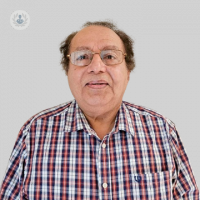What you need to know about ADHD in children
Autore:In this article below, revered consultant paediatrician, Dr Naeem Ahmad, outlines the symptoms associated with ADHD in children before going on to tell us about the diagnosis and treatment.

What is ADHD, and how does it affect children?
Attention Deficit Hyperactivity Disorder (ADHD) is a common neurodevelopmental condition that affects millions of children worldwide. Characterised by persistent patterns of inattention, hyperactivity, and impulsivity, ADHD can significantly impact a child's academic performance, social interactions, and daily functioning.
What are the main symptoms of ADHD in children?
ADHD symptoms typically manifest in early childhood, often becoming noticeable by age the age of seven. They can be categorised into three main types: inattention, hyperactivity, and impulsivity.
- Inattention: Children may have difficulty sustaining attention in tasks or play, often make careless mistakes, seem not to listen when spoken to directly, struggle with organising tasks, and frequently lose items necessary for activities (e.g., toys, school materials).
- Hyperactivity: This may include fidgeting, inability to stay seated, running or climbing in inappropriate situations, difficulty playing quietly, and excessive talking.
- Impulsivity: Impulsive children may frequently interrupt others, have trouble waiting their turn, and may act without thinking about the consequences.
These symptoms can vary in intensity and may change as the child grows. It's important to note that many children exhibit these behaviours occasionally. However, in children with ADHD, these behaviours are more severe and pervasive.
How is ADHD typically diagnosed in children?
Diagnosing ADHD in children involves a comprehensive evaluation by a healthcare professional, typically a paediatrician, psychologist, or psychiatrist. The assessment includes:
- Clinical interviews: Gathering detailed information about the child's behavior from parents, teachers, and the child.
- Behavioural checklists: Standardised questionnaires completed by parents and teachers.
- Observation: Direct observation of the child's behaviour in different settings.
- Medical examination: Ruling out other medical conditions that could explain the symptoms.
Accurate diagnosis is essential, as ADHD can coexist with other disorders such as learning disabilities, anxiety, and depression.
How is ADHD in children managed and treated?
Effective management of ADHD involves a combination of strategies tailored to the child's specific needs, which typically includes:
- Behavioural therapy: Behavioural interventions focus on teaching children skills to manage their symptoms and improve functioning. This may include organisational skills, social skills training, and parent-child interaction therapy.
- Medication: Stimulant medications (such as methylphenidate and amphetamines) and non-stimulant medications can help reduce symptoms of ADHD by enhancing brain function. Medication should be closely monitored by a healthcare professional.
- Educational support: Individualised Education Programs (IEPs) or 504 Plans can provide accommodations and support within the school setting, such as extended time on tests, modified assignments, and preferential seating.
- Parent training: Educating parents about ADHD and effective parenting strategies can improve family dynamics and help manage the child's behaviour at home.
To book a consultation today with Dr Naeem Ahmad, simply visit his Top Doctors profile.


